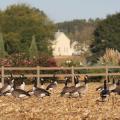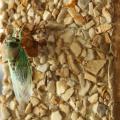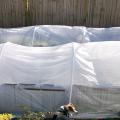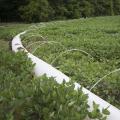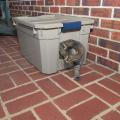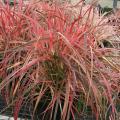News From 2015
Like many home gardeners, I believe I’ll always remember the name of every plant I bring home from the garden center.
Sadly, I found out early in my horticulture career that I was terribly mistaken. I can’t tell you how many times I’ve stood in my landscape scratching my head, racking my brain and wondering just what the name of that plant is.
At the beginning of a new year, perhaps the best resolution any home gardener can make is to finally use plant tags and markers.
STARKVILLE, Miss. -- Winter months bring short days of weak sunlight, cold nights and icy rain. Even though Southern states have relatively mild winters, the more extreme weather conditions make life more difficult.
We humans hide indoors in furnace-warmed air, put on layers of clothing to combat the chill and use insulated coats, hats and gloves when forced to go outside. But what about the creatures that live outdoors? How do they survive until spring’s warm breezes and sunshine once again return?
TYLERTOWN, Miss. -- An upcoming dairy conference will help Mississippi and Louisiana dairy farmers as they face more profit challenges in 2016.
The 26th annual Mississippi-Louisiana Dairy Management Conference will be Jan. 14 at the Southwest Events Center in Walthall County. The event begins with registration and exhibits at 8:30 a.m. Educational presentations begin at 9:15 a.m. and conclude with a sponsored lunch. The conference is free for dairy producers and managers, their family members and employees, and others with an interest in staying abreast of dairy farming issues.
PICAYUNE, Miss. -- Staff at the Southeast’s premier nature conservatory now can spread the word about the facility and events to a broader audience.
The Mississippi State University Crosby Arboretum in Picayune received a $15,000 grant from Visit Mississippi and the Mississippi Development Authority. The arboretum was donated to MSU in 1997 by the arboretum foundation and is a unit of the MSU Extension Service.
The funds will be used to promote greater awareness of the public garden and increase site visits.
STARKVILLE, Miss. -- While many humans anticipate making certain changes with the arrival of a new year, certain insects have much different life cycles.
Periodical cicadas may anticipate emerging from the ground in 2016, while others may simply have to wait a few more years to see the light of day.
Cicadas are curious creatures. From beady eyes on the sides of their heads to prominent veins stretching across their glassy wings, they seem to be created from the Twilight Zone. Yet, they produce one the most common sounds of summer.
We’ve been lucky so far to enjoy a fairly mild beginning to the cool season in the landscape.
In my coastal garden, my Rio Pink dipladenia continues to brighten my garden, growing in its half-barrel container. Other absolute stellar performers are my two large firecracker plants. They have provided nonstop bumblebee action, and the plants are actually humming as I walk by.
STARKVILLE, Miss. -- “Birds of a feather . . .” Can you finish this sentence?
If you answered, “birds of a feather flock together,” you would be right. Wild animals are part of American culture, found in our literature, art and sports team names. Even for those who do not hunt, fish or live in wild places, wildlife may be a part of their lives.
STONEVILLE, Miss. -- Mississippi State University researchers have identified a new disease that has reduced yields in several soybean fields across the state in recent years.
Researchers established the uniqueness of this fungus-based disease and have named it “soybean taproot decline.” It has symptoms similar to some other soybean diseases, including the yellowing of leaves while the veins stay green. Unlike other diseases that affect the crop during specific times in the growing season, soybean taproot decline is something producers will have to watch for year-round.
STONEVILLE, Miss. -- About 190 people gathered Tuesday to focus on water use and conservation, a showing that demonstrates just how important this topic is to the Delta and state.
The Delta Sustainable Water Resources Task Force convened the 2015 Mississippi Delta Irrigation Summit in Stoneville. The event drew farmers, consultants, industry suppliers, university researchers, Extension agents and U.S. Department of Agriculture officials from Mississippi, Arkansas and Louisiana.
STARKVILLE, Miss. -- Neither crop yields nor prices were particularly bad in 2015, but Mississippi’s estimated state agricultural production value still dropped to $7.2 billion, a 4.9 percent decrease from the previous year.
Brian Williams, an agricultural economist with the Mississippi State University Extension Service, said the decline in agricultural value has two causes.
STARKVILLE, Miss. -- Estimates indicate that lower soybean prices caused the value of Mississippi’s top row crop to drop below $1 billion for the first time since 2011 despite producers posting the second highest yield on record.
STARKVILLE, Miss. -- Spared from avian influenza outbreaks in 2015, Mississippi’s poultry industry benefitted significantly from higher egg prices but still felt the pinch from export declines.
Preliminary estimates indicate a 3.4 percent increase in the state’s poultry value. The largest growth is an almost 40 percent increase for eggs. Chickens (replacement egg layers) may be up 5 percent, and broilers were near even with a 0.4 percent increase, according to recent estimates from the Mississippi State University Extension Service.
STONEVILLE, Miss. -- Because bees are important to the success of crops, honeybee health is important to Mississippi State University.
Jeff Gore, Mississippi Agricultural and Forestry Experiment Station researcher at the Delta Research and Extension Center in Stoneville, participated in a recent U.S. Department of Agriculture-Agricultural Research Service study of pesticide toxicity to honeybees. The study was conducted in Stoneville at the USDA-ARS Jamie Whitten Delta States Research Center. It was part of ongoing efforts to protect the population of pollinators.
STARKVILLE, Miss. -- People who care about honeybees know that insecticides and pollinators are usually a bad mix, but it turns out that herbicides used to control weeds can spell even bigger trouble for bees.
Jeff Harris, bee specialist with the MSU Extension Service and Mississippi Agricultural and Forestry Experiment Station researcher, said herbicides destroy bee food sources.
STARKVILLE, Miss. -- The holiday season can be just as much fun for pets as it is for their owners if they are treated with love and care.
Dr. Joey Burt, associate clinical professor and hospital director at the Mississippi State University College of Veterinary Medicine, said pets should be treated as small children and not be kept outside in extreme weather.
The workshop, a program of the 10-year-old collaborative Miss/Lou Rural Tourism Education Initiative, will look at technology trends and how to create virtual tours, along with other interactive sessions and activities.
STARKVILLE, Miss. -- Sylvia Byrd is committed to improving the nutrition and health of low-resource households through her efforts as the new project director for the Mississippi State University Extension Service Office of Nutrition Education.
FOREST, Miss. -- When the new year begins, so do commitments to drop extra pounds and live healthier lifestyles. But many people find it hard to keep these promises to themselves.
Walk-A-Weigh, a program of the Mississippi State University Extension Service, gives people the proper tools to change their lifestyles by helping them improve their eating habits and stick to regular exercise routines. It began as a pilot program in 2015 but will be offered statewide in 2016.
STARKVILLE, Miss. -- Mississippi State University Extension Service Director Gary Jackson recently was selected to be a professional member of North America’s first conservation organization.
Founded by Theodore Roosevelt and George Bird Grinnell in 1887, the Boone and Crockett Club promotes wildlife conservation and management, including sportsmanship, habitat conservation and the ethical standards of fair chase hunting.
Ornamental grasses are reliable warm-season performers that keep on giving, even in winter landscapes. Their color and interesting texture make them great choices for any garden.
A couple of good ornamental grasses that I like are Gulf muhly grass and pampas grass.
Gulf muhly grass is a native plant that really performs in the winter. It flowers in billowy masses that resemble pink clouds in the landscape. The color will hold as long as there isn’t a hard freeze. Even after freezing temperatures, the flower heads keep their airy shape.
Pages
News Types
- Crop Report (428)
- Feature Story (5905)
- Feature Photo (53)
- Extension Outdoors (320)
- Southern Gardening (1481)
- Extension Inbox (95)
Archive
- 2025 (98)
- 2024 (186)
- 2023 (182)
- 2022 (183)
- 2021 (176)
- 2020 (211)
- 2019 (222)
- 2018 (276)
- 2017 (336)
- 2016 (381)
- 2015 (456)
- 2014 (495)
- 2013 (487)
- 2012 (491)
- 2011 (354)
- 2010 (320)
- 2009 (313)
- 2008 (272)
- 2007 (263)
- 2006 (252)
- 2005 (278)
- 2004 (270)
- 2003 (279)
- 2002 (227)
- 2001 (238)
- 2000 (241)
- 1999 (231)
- 1998 (231)
- 1997 (239)
- 1996 (58)
- 1995 (36)


